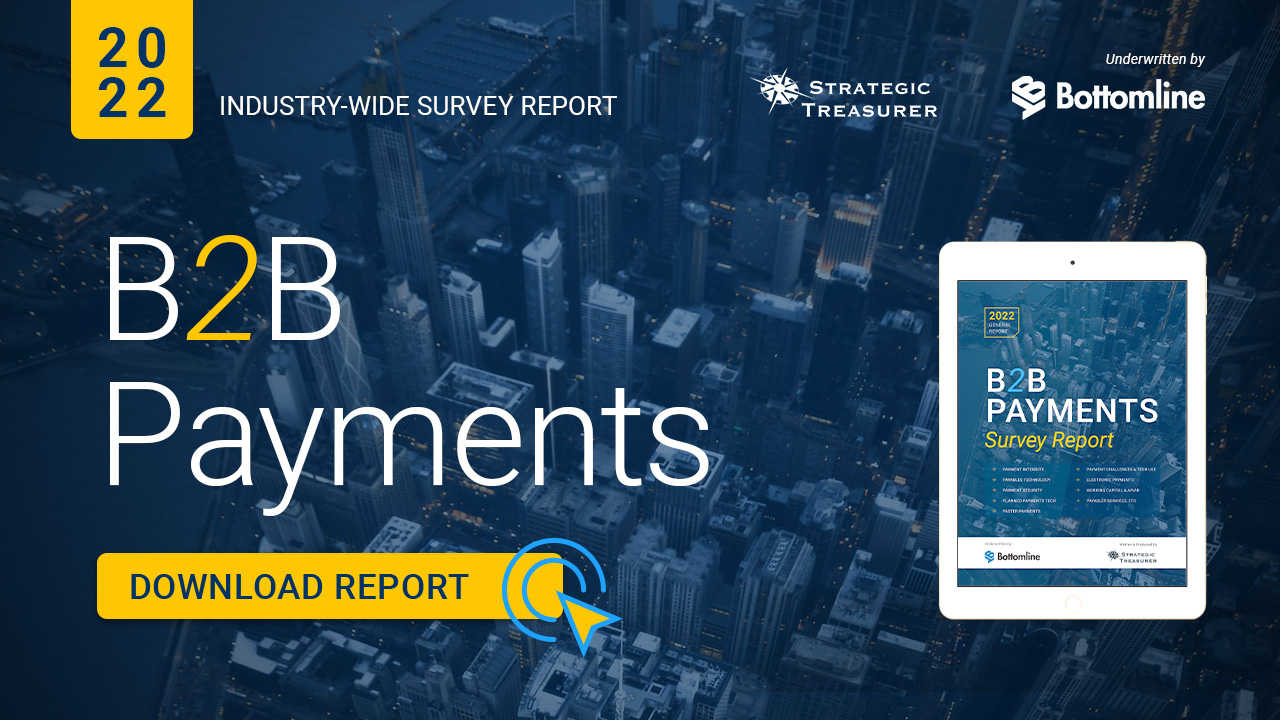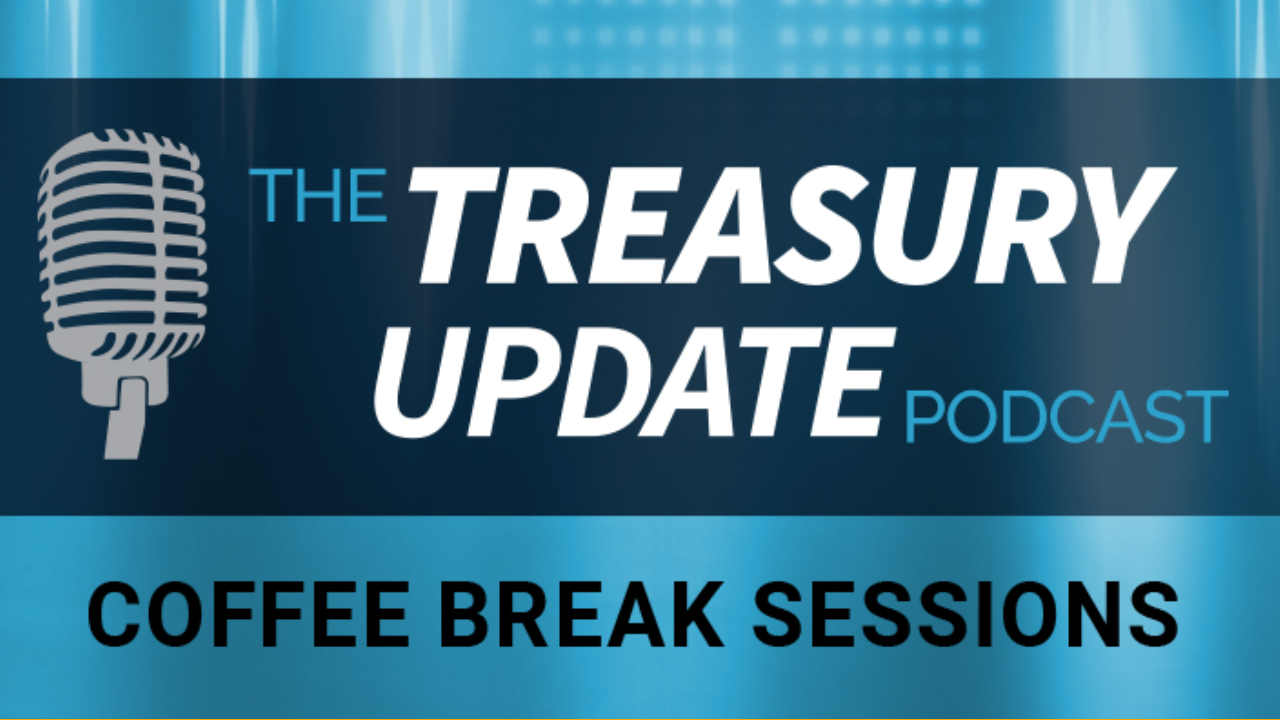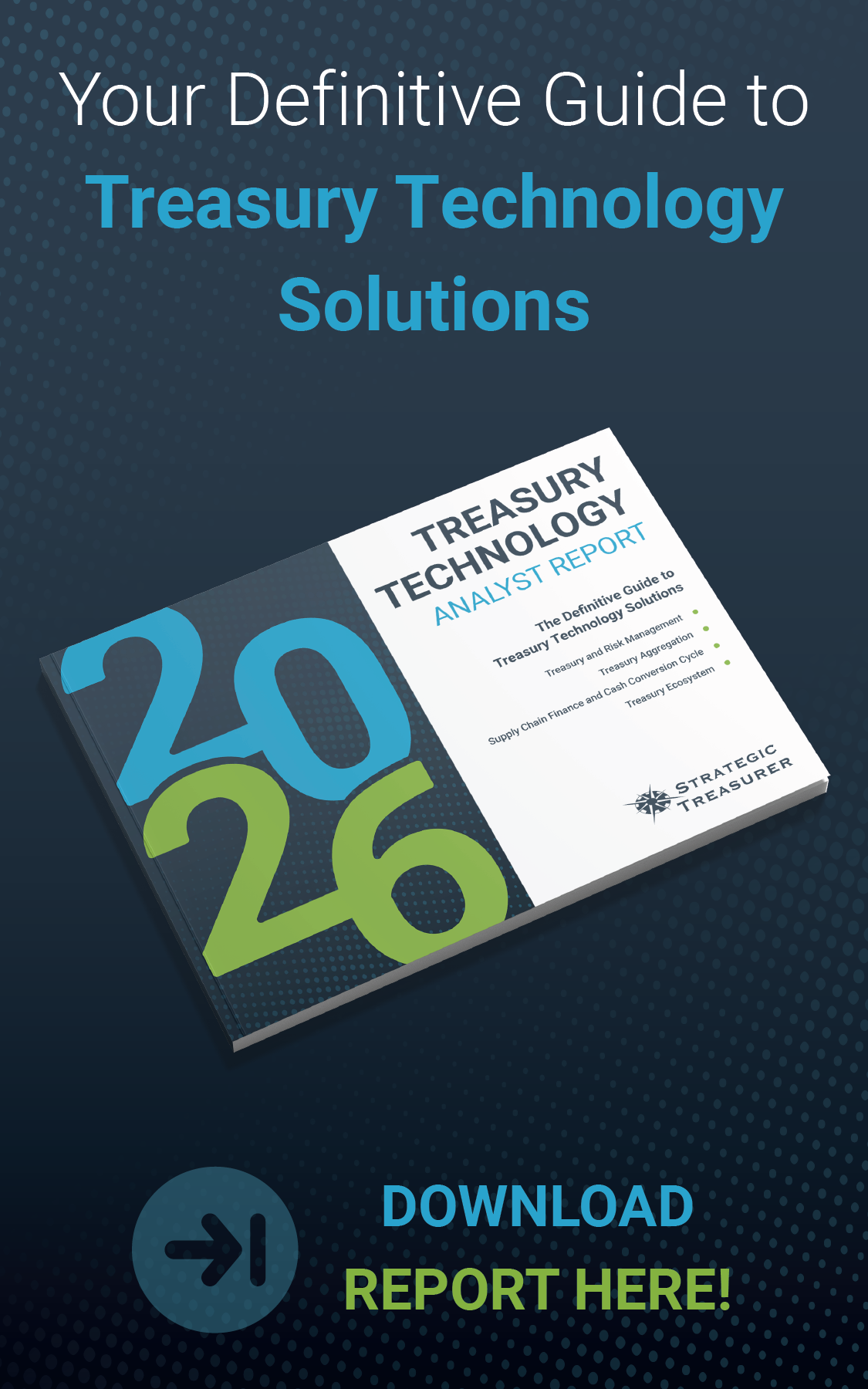
Session 84
Coffee Break Session:
What Are Real-Time Payments?
What are real-time payments? Coffee Break Session Host Jason Campbell catches up with Strategic Treasurer’s Managing Partner, Craig Jeffery, to chat about real-time payments. They discuss how these payments work, the benefits, and the risks. Listen in and learn a little bit about real-time payments.
Host:
Jason Campbell, Strategic Treasurer


Speaker:
Craig Jeffery, Strategic Treasurer


Episode Transcription - (Coffee Break Session Series) - Episode 84 - What Are Real-Time Payments?
Jason Campbell 00:03
Welcome to the Treasury Update Podcast, Coffee Break Sessions presented by Strategic Treasurer covering foundational topics and core treasury issues in about the same amount of time it takes you to drink your cup of coffee. I’ll be your host Jason Campbell, business development leader at Strategic Treasurer. Welcome back for another great episode of the Coffee Break Session. You know, we’re gonna move this one lightning fast compared to our past couple ones in regards to payments, because this is one I find is probably one of, I’ve been looking forward to this one actually. Real time payments. I think my time here at Strategic Treasurer, I’ve, as I keep hearing about real time payments, and you know, having accurate payments, and there’s so many different dialogues, there’s so much conversation that goes around, you know, I’m just so intrigued and interested by it. So I’m looking forward to the session today. And joining me is Craig Jeffery, managing partner at Strategic Treasure. So Craig, welcome to this lightning fast conversation around real time payments.
Craig Jeffery 00:58
Well, I’m not I’m not a lightning fast communicator. So I’ll try to keep up. But if people like to get the bottom line at the front end, real time payments are good.
Jason Campbell 01:08
Well see, that’s how fast this conversation can be. It’s just that is good. All right, well, now actually, it’s going a little bit in depth to make sure like, why is it good? So let’s talk about what exactly are real time payments?
Craig Jeffery 01:20
Well, these are immediate payments that occur in the US over the RTP network. This is run by the clearing house. So if you’re in a different country, you may not know much about the clearing house. But this is a settlement system owned by a bunch of banks. So this is separate from the central bank, you know, most countries have a central bank handles, the different clearing systems, they use a payment clearing systems. In the US we’d like to have something managed by the Fed or the central bank, as well as something that’s set up privately, right? That’s our, that’s our nature, we have that for every place. So the clearing house is one of those methods for settling, settling immediate payments. And you know what our real time payments, these are credit push payments, only, there’s no debits. So a credit payment is the initiator sends the payment to the receivers, the person who’s communicating the transfer is sending money to the other party, there’s no, I’m not debiting you for your insurance bill, I’m only paying you your policy benefits.
Jason Campbell 02:23
So go into a little bit if you don’t mind talking about a system, right? There’s always gonna be a system, process, systems, you know, parameters, things that so let’s Is there a system for this? And if so, like how does it work?
Craig Jeffery 02:35
Yeah, there, there is a system for this. It’s the RTP network, so run by the Clearinghouse. So as a new platform, it’s a new payment rail. And I think they’re, they’re quite proud about mentioning, it’s like, the first it’s one of the first new payment rails in like 40 years in the US. Now there’s other new payment rails coming on as well. But this is this a new platform for handling those transfers. Now, most corporate treasury corporate AP professionals don’t really know about the systems that the banks use or that clear money, but just knowing that they exist is is helpful. So there is a there is a network for for processing.
Jason Campbell 03:16
That’s funny keep saying rails and even though this is a lightning fast conversation, I’m thinking bullet trains, fast trains, you know, that’s just what was in my mind. Right? You were going through this?
Craig Jeffery 03:25
Yeah, they call it rails, I think I’m not sure why. But you think, Oh, my payment goes over some rail? Well, none of these payments actually went on a rail. But you can picture in your mind. It’s a it’s a system, right? I mean, so many of these things are virtual electronic, how do we how do we picture them in our heads or create an image. So whether it’s a rail, or maybe you’d say, uh, you know, you see a jet in the sky, you see the pathway in the sky.
Jason Campbell 03:48
I wonder if you can kind of dive in a little deeper and talking about, as we said at the beginning, right, real time payments, good. Why? Let’s go a little bit more wide. What are some good benefits around this particular side of payments?
Craig Jeffery 04:00
There’s, there’s a couple and you can certainly go to the Clearinghouse and see all of their literature on it. And there’s quite a bit on there. Maybe we should drop that in the show notes. But speed matters in payments to some extent, in some cases, and to a great extent and other. So real time payments are quick. Data matters as well. So better formats matter. And that’s kind of a hard thing to cover in a podcast, but richer data, more structured data, like XML and formats that contain better data matter as well. But what are some of the what are some of the benefits? I took the liberty knowing you’re going to ask me about real time payments of copying some of those out there. So I think this is cheating for a podcast, but who knows, right? You’re sharing our voice this. One is it’s open 24/7. If you use Fed Wire, it’s open and closed, right? Maybe the bank leaves it open, but those payments aren’t going to go until the next day. So this is open 24/7. So whether you’re sending or receiving payments open all the time. The other is when the money hits there, it’s immediately available. You think about that process where it’s like, oh, okay, it’s gonna clear the next day you got a memo, memo credit, tomorrow have credit for that. Well, this is immediately available and hits. You have availability, that’s, that’s pretty important for consumers and for corporations. The other issue is like revoke ability, and irrevocability. So, like, wire transfers are always known as irrevocable, like, you can’t just force it back through the payment system. If someone if you paid someone incorrectly, and they won’t send it back to you, and you can’t convince the banks to do that, you might have to go through the courts to get them to send it back to you. And there are certain times where you don’t want something can be revoked or withdrawn. So that is really, really important. The other the other piece that I’ll say is, it used to be we, we talked about ubiquity all the time, right. You know, every place everywhere. And this idea of ubiquity, as this can be used, you can access this, if you’re a federally insured depository institution. So any US depository institution can be a participant, no matter how big or how small they are, they don’t have to own the Clearinghouse, but it’s everyone can participate. You know, those are some of the key things. The other is a forward looking item. You’ve heard us talk about open treasury, open banking, this idea of how can I extend what I do? You know, if I’m a bank, how can I put payments within an ERP platform? If I’m sharing information? Where does that information need to go needs to go into a treasury system? How can I, you know, extend what’s being done into another system that’s, that’s more direct, more readily available more out of the box. And so they refer to extensibility. And this is, this is the type of format and messaging that will support other types of, you know, initiation and transactions. You know, for example, that we want to do a request for payment, or we send an invoice, we want that to be a request for payment, so that it allows for this extension of the business transaction more streamline. And so those are some of the big features. I mean, 24/7 is is really one of the most interesting. Thanks for that.
Jason Campbell 07:17
I think you just confirmed that money doesn’t sleep. I think that’s what you just said.
Craig Jeffery 07:22
I did, I said with a lot more words, like way more words. Money doesn’t sleep.
Jason Campbell 07:28
24/7. It’s open all the time.
Craig Jeffery 07:31
Cash is king, money doesn’t sleep, you’ll trigger me into saying some those common things.
Jason Campbell 07:38
I love it. I love it. Alright, so now we talked about some of the great benefits. And I know you had mentioned kind of one risk is that, you know, irrevocability that you spoke of. But what are you know, I mean, obviously, that’s, that’s a pretty significant one. That’s, that’s big, if you have to all of a sudden your money has been sent to the wrong place. And you can’t work with whether it’s in network or the bank to, you know, bring it back and you have to go through a court system, they get added on, you know, potential costs and potential losses that come to that point or whether or not you can get it back. Right. So what are some of the other risks and out there that relates to real time payments.
Craig Jeffery 08:10
It not just with real time payments, but with every every payment methodology, the concern about payment fraud, and the security have around payments, the initiation, far too many companies are not careful enough with their payment processes, the controls around them, I mean, far too often you hear good sized corporations avoiding using security services that their banks offer that are commercially reasonable that a normal bank and normal company should be using. And they dismiss them because maybe 10 years ago, they weren’t relevant, or they think the bank is going to bear all the risk on these transactions. Every single payment system, I’m going to answer that question, what are the risks? It’s payment fraud, the need to protect the most liquid assets of the organization, which are payments, either from direct attack and compromise of a system, or compromise of a person’s brain through business email compromise, or through some other method to get you to send payments through any of these payment methods. So that’s my, that’s my biggest concern on that. I mean, it’s it’s usually about payment fraud.
Jason Campbell 09:18
As you were talking about the risk, and you were talking about payment fraud and I think it’s, it can’t be necessarily afraid of things, it’s more so of being inquisitive and peeling back the layers as much as you can, and build it back to knowing that it’s a great process it can has a lot of great upsides, a lot of great benefits, but you got to ensure right and have that confidence put into your system capabilities, and not just your systems, your your people right your your departments who are handling these cash transactions to ensure that they have the proper training and the proper tools and everything the stars, the moon align, right, to ensure that you have your I’s dotted and your T’s crossed, in a sense, right?
Craig Jeffery 09:56
Yeah. So I mean, some of the some of the security principles of you know using what’s commercially reasonable, your bankers tell you things, you should listen to them. They’re not doing it to make a killing on the small fees they charge for their security services. They know what a pain it is, when you suffer a loss and how it’s not just the loss of the funds that you have, it’s the embarrassment, it’s the time wasted trying to resolve that. So listen to that very seriously. The other is, some of the other protection methods, we’re all used to things like dual controls to protect transactions and transfers. But sometimes we don’t think about what happens to payment instructions, or payment files, as they move from system to system or moved from system to an entry point, let’s say to enter them in a bank portal, or to load a file through a bank portal, or to create a file that gets posted via SFTP. Each of those places has a file that there’s a point of exposure, where that could be that file could be manipulated, or changed, or a new file created and sent, which could go and move money to an account that a criminal controls. And so that’s, that’s one aspect, you know, bank services, thinking about the control process that’s inside a company, all the way to the bank, as well as, as you’re saying this, people being trained, not just on things like phishing, and keeping a clean desktop, a hygenic a desktop, but ensuring they understand the various ways that criminals, you know, try to penetrate your system, try to compromise people so that they get access to the funds or have you transfer the funds or get transfers out. There’s a significant number of plays in their playbook according to different categories that they’re trying to do this. And so strengthening the human element, making sure you have a internal secure payment process, as well as using commercially reasonable security procedures and services that your banks offer. Those are all quite useful. I know that was a big riff on security, when you asked a simple question at the end, but that’s what you got. Wasn’t at lightning speed, it was, it was excessive information.
Jason Campbell 12:08
It’s always serious when you talk about security, right? So I mean, like, it’s good to have those conversations, because it’s good to have like the point where, yeah, it’s a serious nature, right, but you can’t be afraid of things, you know, and, and we just got to make sure that you know, having a like you said a plan, right and having a plan, executed plan and double tracking that plan itself, but realize that there’s a lot of upside to real time payments to be lightning fast. So again, Craig, thank you so much for joining me today. I really appreciate it. I was really looking forward to this part of this conversation. And for our listeners, be sure to tune in every first and third Thursday of the month for a new episode of the Coffee Break Session. As usual, if you have any questions, comments or feedback, please send us a note at podcast@strategictreasurer.com. And until next time, take care.
Announcer 12:57
This podcast is provided for informational purposes only and statements made by Strategic Treasurer LLC on this podcast are not intended as legal, business, consulting, or tax advice. For more information, visit and bookmark StrategicTreasurer.com.
B2B Payments Report
This study provides valuable insights related to the overall payments complexity and challenges being experienced by practitioners within the treasury and finance environment, and also sheds light on the unique solutions and tactics employed by organizations to optimize payment processes and maximize efficiency.
Coffee Break Sessions – A Treasury Update Podcast Series
A part of the Treasury Update Podcast, Coffee Break Sessions are 6-12 minute bite-size episodes covering foundational topics and core treasury issues in about the same amount of time it takes you to drink your coffee. The show episodes are released every first and third Thursday of the month with Host Jason Campbell of Strategic Treasurer.




